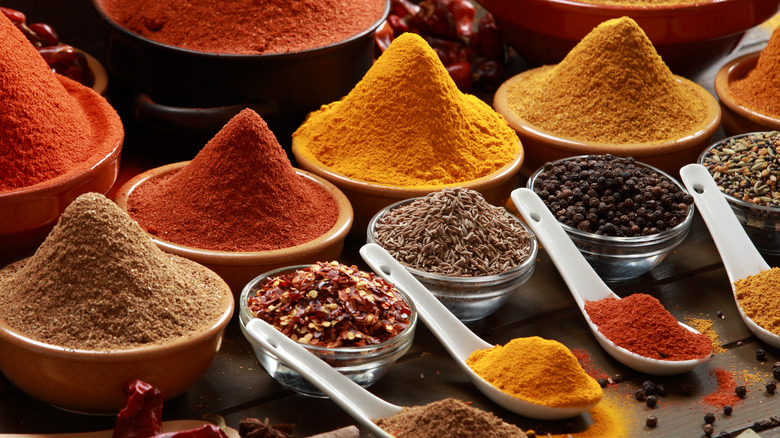These Are The Spices That Help Decrease Inflammation
Fighting inflammation is a serious undertaking. Noted as an underlying cause behind various health issues, inflammation can cause anything from heart disease to cancer and autoimmune issues. Lifestyle choices such as your diet are critical in fighting this issue and keeping your body healthy. Luckily, a few spices are active inflammation-busting ingredients and you can add them to your meals for a protective boost.
Of course, turmeric is the classic spice that people swear by when it comes to heart health and pain relief. Jessica Cording, M.S., R.D., CDN. explains the reasoning behind this to Mindbodygreen, "Turmeric's active compound, curcumin, has been extensively studied for its disease-fighting potential and preventive health benefits."
But, beyond the classic yellow-orange staple, there are other spices that boast similar health benefits. The outlet cites nutmeg as a potent anti-inflammatory agent with loads of compounds such as sabinene, terpineol, and pinene. Its sister spice, cinnamon, also fights inflammation; just be sure to opt for Ceylon cinnamon over Cassia as this type has less coumarin, the outlet adds. This compound can be damaging to your liver in large amounts. But, when you add cinnamon to your coffee every day, you can reap these benefits alongside the delicious taste.
You can take spices as a supplement
If turmeric or cinnamon isn't your favorite flavor, you can ingest capsules as a way to absorb their anti-inflammatory benefits. Especially if you suffer from inflammatory conditions like arthritis or eczema, adding these spices to your dishes and supplement routine can make a big difference in how you feel. You can find these supplements at your local health foods store to naturally fight inflammation. But, if you'd rather eat your spices, there are a lot of inflammation-reducing options to choose from.
Garlic, known for its antiviral properties, also tamps down free radicals. Indeed. Healthline reports that eating garlic has reduced arthritis pain in adults and may even reduce cartilage damage. Furthermore, cayenne provides antioxidants alongside other vitamins such as magnesium and potassium, Mindbodygreen notes. Try adding both spices to your next stew or dip for a healthy, spicy boost to your classic recipes. Plus, a lesser-known spice called sumac is a powerhouse for these nutrients as well; you can pick it up at your local health foods store to give it a try.
When looking for heart-healthy cooking options, your spice cabinet should provide plenty of options that reduce inflammation that taste amazing.

